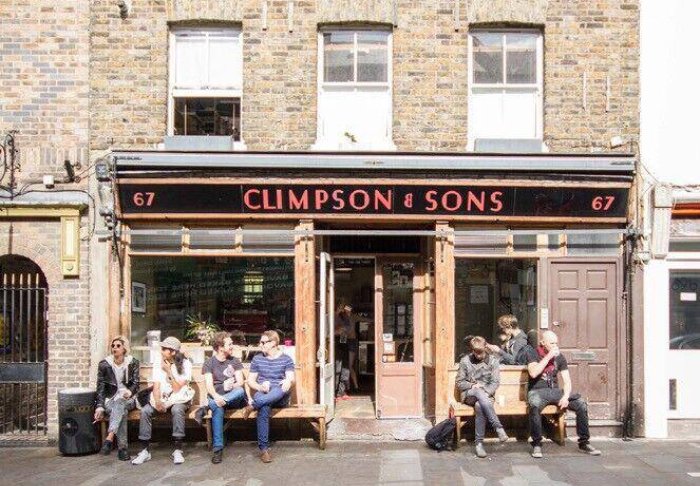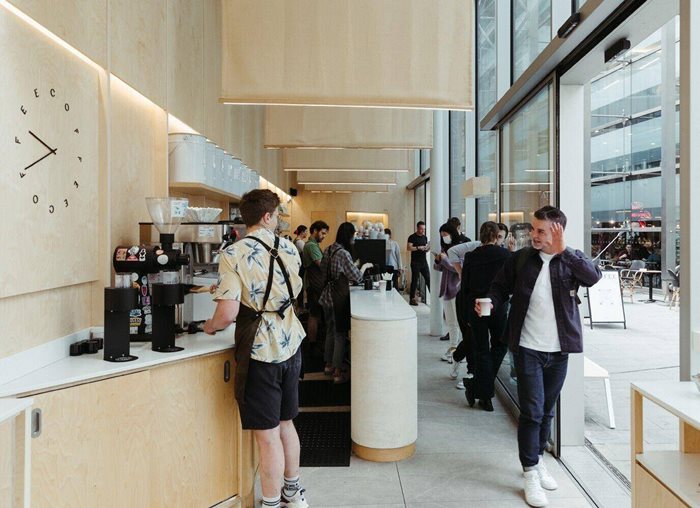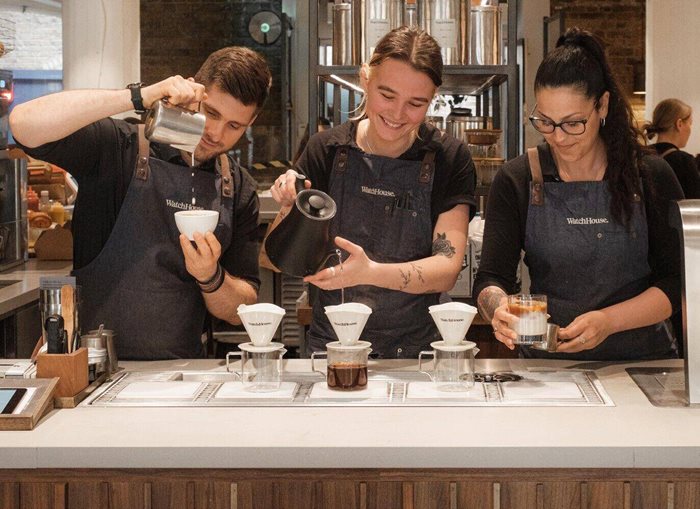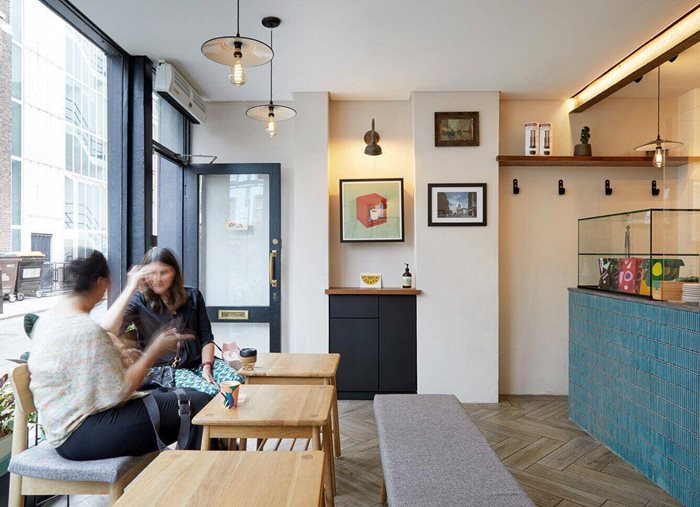Over the last 20 years London has emerged from relative obscurity as one of the world’s most prestigious destinations for specialty coffee and café culture. Today, the UK capital is a melting pot of specialty independents consistently raising the bar for quality and attracting global acclaim. World Coffee Portal caught up with some of the influential operators writing the next chapter of London’s epic coffee story
.jpg.aspx?lang=en-GB&width=700&height=472)
The La Marzocco KB90 machine at Climpson & Sons, Broadway Market, East London | Photo credit: Climpson & Sons
With a population of nine million, more than 300 languages spoken and over 200 nationalities present, London is frequently lauded as the cultural capital of the world.
Coffee has long been a part of London’s rich cultural heritage. The city’s first coffee house was opened in 1652 by Pasqua Rosée, a former servant variously recorded as Sicilian or Armenian, at a long-lost site still marked at St Michael’s Alley off Cornhill.
That venue was precursor to Lloyd’s Coffee House on Tower Street, which became a popular haunt for merchants in the late 1600s and kickstarted coffee’s ascent as the beverage of choice among London’s financial and intellectual elite during the 17th and 18th centuries.
Today, it is still possible to drink-in London’s hallowed coffee history. Soho’s Algerian Coffee Stores has been in business since 1887 and nearby Bar Italia has been perking up locals since 1949. In 1979 Monmouth Coffee established what was arguably the capital’s first specialty roastery in Covent Garden.
However, it is only in the last 20 years that London has garnered a reputation for coffee excellence on the world stage. The 2000s saw an influx of antipodean operators, such as Flat White, Milkbar and Kaffeine, raise the bar for quality and store design. In the 2010s, boutique brands such as Caravan, Grind and Daisy Green further innovated London’s specialty coffee scene, fusing cafés, bars and fine dining across multiple sites.
2011 saw London’s coffee community celebrate under one roof for the first time with the launch of The London Coffee Festival by Allegra Group.
Today, London is a melting pot of coffee commerce and creativity. However, it was the city’s specialty independents that brought once niche propositions such as the flat white, single origin, pour-overs and latte art to the masses – and many of these nimble businesses remain streets ahead of larger competitors when it comes to innovation.
“Consumers are seeking out quality and want to know where their coffee comes from”
Nicole Ferris, Managing Director, Climpson & Sons

Climpson & Sons flagship coffee shop on Broadway Market | Photo credit: Climpson & Sons
It’s nearly two decades since Climpson & Sons opened its flagship café on London’s Broadway market. A pioneer of east London’s influential specialty coffee scene, the business has achieved significant scale by becoming one of London’s major specialty coffee wholesalers, supplying around 350 accounts from its London Fields Roastery and providing coffee training from its nearby Climpson’s Academy.
Further south, Climpson’s Old Spitalfields Market coffee bar focuses on contemporary trends, offering a nitro cold brew and espresso martinis on tap alongside a curated menu of single origin filter coffees.
As Climpson & Son’s Managing Director Nicole Ferris explains, this approach has enabled the business to grow while maintaining the integrity of its much-loved original café.
“Our coffee shop on Broadway Market is such a special space, it has heart, soul and a really big community – that’s very hard to replicate,” she says.
Originally from New Zealand, Ferris first joined Climpson & Sons in 2013 and has witnessed the development of London’s coffee sophistication first-hand.
“You can get a good cup of coffee at most places in London, which is one of the great developments over the last few years. Consumers are seeking out quality, want to know where their coffee comes from and are thinking about sustainable sourcing,” she says.
Peter Dore-Smith is founder of Kaffeine, another of London’s influential specialty coffee innovators, which opened its first store in Fitzrovia in 2009 and a second in 2015.
“Coffee has become popular culture,” he says. “I put that down to the influence of people like James Hoffmann on YouTube and social media, but also consumers making more coffee at home during the pandemic.
“Back in the day most people didn’t know what a flat white was, but now everybody orders it,” he adds.
As further evidence of the widespread development of London’s coffee knowledge, Dore-Smith observes many of London’s increasingly sophisticated consumers are migrating from branded coffee chains to smaller specialty independents like his own.
“The demographic of our customers has widened. We’re getting a lot of people asking for coffee with syrups – which we don’t offer – but my assumption is these are people who would normally go to a branded chain, which shows there is now greater acceptance of going to an independent.”
Founded in 2018, Rosslyn Coffee is riding high on London’s growing thirst for specialty coffee – and delivering to widespread acclaim. With three stores in the City of London, Rosslyn is listed in The Financial Times’ 30 best independent coffee shops in the world and was voted Europe’s Best Independent Coffee Shop at Allegra’s European Coffee Awards in 2022.
“What I love most is the eclectic nature of the city,” says co-founder James Hennebry. “London benefits from being diverse and we try to reflect that in our business; it makes us much more creative and effective,” he adds.

Rosslyn Coffee’s store at Tower 42 in the City of London | Photo credit: Rosslyn Coffee
Business as usual?
London certainly has a wealth of global inspiration at its disposal, not to mention a deep pool of affluent consumers to draw from. Nevertheless, the capital’s coffee shops have been hit hard over the last three years, first by the pandemic and now by the soaring cost of energy, raw materials and staff.
Operating in an office and commercial district, Hennebry notes day part trade has been skewed, but not necessarily diminished, due to increased home working and less frequent commuting.
“It’s more loaded into Tuesday, Wednesday and Thursday now, whereas before Covid it was more evenly split. This says to me there is not as much pressure for people to be in the office,” he says.
Kaffeine’s Dore-Smith has also noted a shift in footfall across his stores in Fitzrovia, an upmarket area close to one of London’s busiest shopping and tourist districts.
“It’s certainly not business as usual,” he reflects on trading following the lifting of all Covid restrictions in early 2022. “Mondays and Fridays are pretty quiet, but before Christmas, it was getting busy on those days too. Based on last year I expect that to start picking up once the weather gets better, tourists return and people start coming into the office more often,” he says.
A labour of love
Attracting and retaining quality staff has also proved a major challenge for many of London’s coffee shops following the pandemic. World Coffee Portal research shows 51% of UK branded coffee chain operators surveyed in late 2022 cited staff recruitment as a lingering headwind from the pandemic.
However, Rosslyn Coffee’s Hennebry says recruitment has so far not proved problematic for his business. Rosslyn is a staunch advocate of the London Living Wage – currently £11.95 ($14.15) per hour versus the £9.50 national minimum wage – and one of the few such accredited specialty coffee shops in the City of London.
“We take good care of our team members so that they can take good care of our guests,” he says.
“To be clear, I do not believe that it’s something which we should be getting a pat on the back for – this is the bare minimum that an employer ought to be providing. It’s simply not acceptable to be paying less than the Living Wage in my opinion,” he adds.
“London benefits from being diverse and we try to reflect that in our business”
James Hennebry, Co-founder, Rosslyn Coffee
With Brexit deterring many European baristas from working in the UK capital and the pandemic leading to many other hospitality workers leaving the city or seeking work in other industries, London’s reputation as a city of diversity has been challenged in recent years.
Even as a London Living Wage employer, WatchHouse, which operates 14 specialty coffee shops and a roastery in the UK capital, has found hiring experienced baristas challenging, with many applicants lacking experience.
“Many European workers left the UK after Brexit. It’s now very hard to get experienced baristas so there has been a big change in how much we invest in training,” says WatchHouse Head of Coffee, Ryan Garrick.
Originally from Glasgow, Garrick says London was the natural location to progress his coffee career when he joined the business in 2014. However, despite the current challenges, he maintains the UK capital still attracts strong international talent.
“We have baristas from Asia, South America and Europe. That makes London very vibrant and there is diverse opinion versus working in other cities where it can be a bit more closed,” he says.
Meanwhile, Kaffeine’s Dore-Smith has observed a growing number of UK workers interested in becoming baristas as specialty coffee culture gains traction across the country.
“When I opened in 2009 not many people knew what a specialty coffee shop was. Now there are baristas all over the country, they’ve just got to find you,” he says. “We’ve been able to recruit lots of wonderful people from pubs, who instead of working with alcohol are now in a lovely café environment with daytime hours.”
That sentiment is echoed by Nicole Ferris, who says Climpson’s Academy is in high demand, particularly for training on the basics of equipment operation and maintenance.
“London is naturally seen as very high level and as one of the best coffee cities in the world”
Ryan Garrick, Head of Coffee, WatchHouse
“There’s a lot more focus on people wanting to know the basic skills and it can be difficult for us to train every single person that comes through the door. We’ve tried to train more trainers that can work across big venues or multiple sites,” she explains.
Opportunities for growth
Despite current challenges, London clearly has tremendous growth potential for specialty coffee shops and operators are once again moving with the times.
Kaffeine has opted for a laser focus on its two central London stores over outlet growth and has introduced new menu items, including filter coffee and a freshly prepared Aussie-brunch food offer.
“We stopped taking cash after the pandemic, which allowed us to have more space on the bar to put in a batch brew machine. That’s been super popular and around 5% of our drinks are now filter,” he says.
“We also introduced a brunch menu which has been very good for us. We might do 50-60 lunch meals on a busy day. This has definitely increased our spend per head and pulls customers here instead of going elsewhere.”
For Rosslyn Coffee, taking a mindful approach to neighbourhood demand has been central to the brand’s choice of new locations and pace of expansion.
“Some operators may look to grow to a certain size with a view to sell. That’s not on our radar at all,” says Hennebry.
“If we think we can improve the coffee in an area we’ll open a store. If we open a shop that genuinely contributes to the area, then people will drink coffee and come back every day – when you’ve got busy sites your business works. It’s that simple.”
However, as the rapid rise of US premium coffee chain Blank Street Coffee, which has opened 14 London stores in just a few months demonstrates, the UK capital holds tremendous opportunity for specialty coffee shops opting to open multiple sites.
With carefully curated stores in sublime historical buildings, WatchHouse prides itself on the individuality of its 14 ʻhousesʼ, preserving each location’s heritage while delivering its take on the modern coffee experience.
“London is naturally seen as very high level and as one of the best coffee cities in the world – depending on how you define that. It is also one of the busiest places for specialty coffee in the world. We have shops that serve 1,100 coffees a day,” says Garrick.
After crowdfunding nearly £5m ($6m) in late 2022, WatchHouse is in the process of opening a coffee shop and roastery in New York, which will make it one of the few London independents to scale internationally.

Baristas working at a WatchHouse coffee shop | Photo credit: WatchHouse
Bring in the bean counters
It’s evident there is high demand for London’s specialty coffee shops. Nevertheless, trading conditions for hospitality businesses remain tough following the shock of the pandemic
World Coffee Portal research shows just 37% of UK branded coffee shop operators are positive about current trading, down from 57% 12 months ago as the cost-of-living crisis presents a fresh headache.
Soaring inflation has taken a further toll on London’s operators as disposable incomes have decreased and rising costs further erode profit margins.
“Rising costs have been huge for us over the last year,” says Climpson’s Ferris. “We’ve put up our prices for everything – from cups of coffee to wholesale and retail. The price of green coffee is up 15-20% at least. Deliveries, staff costs, energy – everything went up, so we had to react.”
However, as with the financial crisis of 2007-2008, coffee is proving resilient as an affordable luxury. The so-called ‘lipstick effect’, a term coined by cosmetics magnate Estée Lauder in 2001, describes increased spending on relatively small luxuries over larger purchases during economic hardship.
As with previous crises, coffee fits into this niche group of products, with consumers reluctant to give up their daily coffee ritual.
But could falling consumer confidence have an adverse impact on higher-priced specialty coffee when competing against commodity-led chains? Rosslyn’s Hennebry doesn’t believe so and points to the inherent value specialty coffee offers.
“Specialty coffee is premium and luxurious in everything except price,” he says. “It’s such a bargain when you look at how many hands it passes through – from the farms and exporters to roasters and the barista. The value you get for £3.50 versus the national chains with commodity coffee where you’re paying £3.20 is phenomenal.”
Consumers have also proven eager to return to cafés in person – a vital facet of the specialty coffee experience – and even more so for a multi-site specialty operator like WatchHouse.
“I never bought into the idea that people were going to switch to getting coffee online. I always felt people would return to coffee shops with a little more knowledge from drinking coffee at home and I think things have more or less gone back to normal,” says Garrick.
The coffee community is back
While larger coffee chains tapped into economies of scale to rapidly implement e-commerce and digital sales during the pandemic, London’s specialty independents continue to thrive thanks to a close-knit community of like-minded professionals and loyal customers.

Interior of Archetype Coffee | Photo Credit: Anna Stathaki
“We're working out how to make this space as ready for scalability as possible”
Aaron Murly, owner, Archetype Coffee
Aaron Murly is emblematic of the London coffee scene’s entrepreneurial spirit. Opening Fitzrovia-based Archetype Coffee in January 2022, Murly utilised his background in hospitality and market research to establish a specialty coffee shop that has rapidly embedded itself in the local community.
Archetype is a stone’s throw away from esteemed venues, such as Kaffeine, Workshop Coffee, Attendant Coffee Roasters, Kafi, Kiss the Hippo, Hagen and WatchHouse – to name a few – a business community that Murly says has welcomed him with open arms.
“There is a very strong community in Fitzrovia. One of the things I didn’t realise when I opened was how amazing it is to get along with so many people who have become friends and mentors.”
With 14 months in business now under his belt, Murly isn’t quite the new kid on the block anymore and his store, bustling with locals on first-name terms, feels well and truly integrated into the community.
Looking to the year ahead, Murly says his focuses will be to double down on his store’s neighbourhood-centric appeal, optimise his existing space for customers and explore new products, including bubble tea and chia-infused juices. “We’re working out how to make this space as ready for scalability as possible,” he says.
A world of opportunity
Following the profound disruption of the pandemic and even facing the fresh hurdles of inflation, rising energy costs and dampened consumer spending power, many of London’s top coffee shops now are back in full swing.
Tempered by these challenges, London’s coffee shop scene is today characterised by a new era of slick operators with polished propositions, quietly commercial and consistently maximising the potential of their unique market appeal.
“London has already got some incredible roasters and coffee shops and it has room for more,” says Rosslyn’s Hennebry.
As WatchHouse’s Garrick points out, there is always room for improvement, and he would like to see London’s specialty roasters obtain more of the world’s rarest coffees.
“At auctions like the Cup of Excellence you’ll see top coffees going to Asia or Australia, but you’ll rarely see a UK or London name,” he says.
That being said, in just over two decades London has propelled itself to the top tier of the world’s coffee cities, a testament to the work of its open-minded, diverse and quality-driven specialty independents. With consumer appetite showing no signs of slowing, London looks set to build on its global reputation for coffee excellence – so long as it keeps its doors wide open to the world.
This article was first published in Issue 14 of 5THWAVE magazine.
Subscribe to 5THWAVE to receive each edition in print and digitally or sign up to our newsletter and be the first to read the latest articles and updates on World Coffee Portal research.
